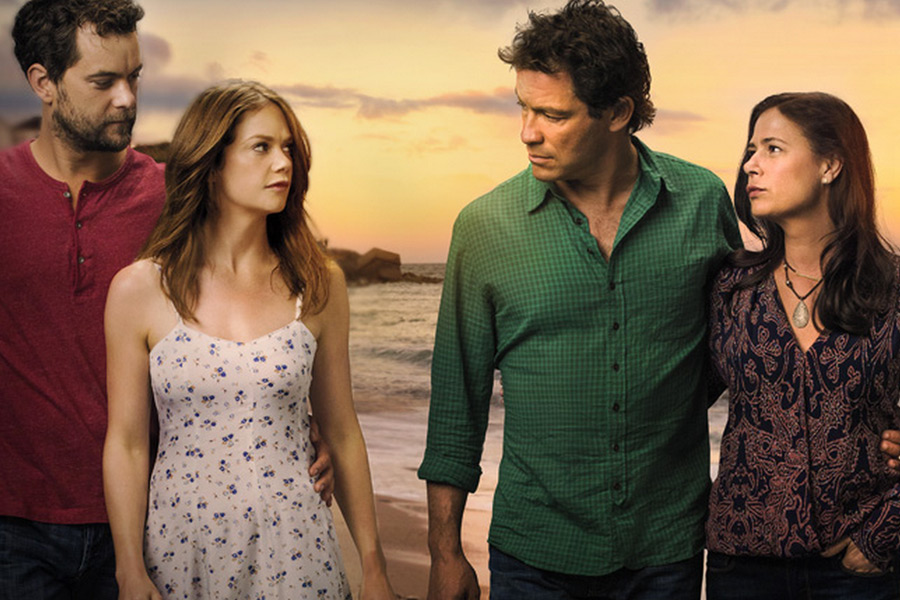ABOVE AVERAGE

The Affair was widely acclaimed in its first season, but could it be stretched beyond that? The Affair struggled at first, but adapted and made a strong comeback in its two final years. It’s typical of our times that people didn’t seem to notice; if a TV series loses its way after the successful first season audiences are gone in an instant, finding a new shiny project worthy of our eyeballs. Thankfully, you’ll always have a chance to give The Affair a second look.
Struggling to write his second novel
Everything began in Montauk, New York. This was where Noah Solloway (Dominic West) took his family on vacation over the summer, staying at his wife Helen’s (Maura Tierney) wealthy parents’ estate. Noah was working as a teacher at the time, struggling to write his second novel. He met Alison Bailey (Ruth Wilson) at a lobster diner where she was working as a waitress. Intrigued by her, Noah looked her up and they later had an affair. Alison was also married, to Cole (Joshua Jackson). As we saw the affair between Noah and Alison develop, we also got to know Helen and Cole… and were treated to flash-forwards where Noah became a suspect as police investigated a mysterious death.
Comparison with Rashomon
In the beginning, each episode was divided into two parts told from the perspective of Noah and Alison. As co-creator Sarah Treem put it, this concept made The Affair ”the Rashomon of relationship dramas”. It was indeed what made the show intriguing at first, because Noah and Alison remembered things quite differently. After each episode, audiences could debate what had really taken place. Years before #metoo shook Hollywood to its foundation, this show knew exactly how to illustrate different viewpoints between the genders and how men easily could misread women. In its last season, #metoo became an outspoken theme as Noah had to face accusations that he had behaved improperly around women.
Sarah Treem made wise decisions, changing the strict structure of the Rashomon concept.
In the second season of The Affair, Helen and Cole’s perspectives were also introduced as the two marriages were falling apart after Noah and Alison’s affair. But where was the show going after that? The Affair seemed to enter unknown territory, as the marriages and the police investigation had reached a conclusion. While still watchable enough, the third season was probably when many in the audience decided this was the end of the road. But Treem made wise decisions, changing the strict structure of the Rashomon concept; instead of having the audience compare the narrow details of events, the narrative became looser, offering perspectives that differed in broader, more interesting ways. The Affair improved a lot in the last two seasons as it offered surprising twists and ultimately settled on the portrayal of Noah and Helen’s journey as the emotional core of the show.
The series also made the bold choice of introducing yet another perspective in the fifth season, that of Alison’s daughter Joanie (Anna Paquin), set a few decades into the future. An off-putting sci-fi idea to some viewers, perhaps, but Treem and her writing team tied it all together nicely in the final episodes, delivering an emotional wallop.
Throughout The Affair the cast was superb, especially West and Tierney as two very human characters. Warts and all, they symbolized what it means to be an adult, having to constantly confront all the bullshit in your life.
The Affair 2014-2019:U.S. 53 episodes. Color. Created by Sarah Treem, Hagai Levi. Theme: “Container” (Fiona Apple). Cast: Dominic West (Noah Solloway), Maura Tierney (Helen Solloway), Joshua Jackson (Cole Lockhart, 14-18), Ruth Wilson (Alison Bailey, 14-18), Julia Goldani Telles, Jadon Sand, Omar Metwally (15-19), Catalina Sandino Moreno (15-18), Jake Siciliano (14-17), Josh Stamberg (14-16), Sanaa Lathan (18-19), Iréne Jacob (16), Anna Paquin (19).
Golden Globes: Best Drama Series, Actress (Wilson) 15; Supporting Actress (Tierney) 16.
Last word: “It’s interesting, because these characters go through so much, and there have definitely been times over the years where people have been angry about that. And they’re like, ‘Oh, you must hate these characters.’ And it’s like, are you kidding? I love these characters more than anything – and that’s why they suffer so much, so deeply, because I’m trying to put them through the entire range of human emotion. Characters you didn’t love or didn’t believe in, you wouldn’t care enough to invest with this tragic journey with them.” (Treem, Vanity Fair)
